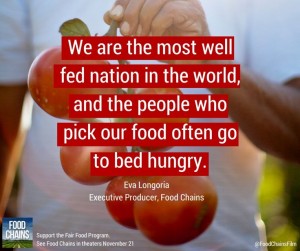 That old saying ‘ignorance is bliss’ is undoubtedly applicable when it comes to human rights and agriculture. It would be fairly safe to say personally, I don’t think I’ve ever picked up a tomato at a supermarket, or any other vegetable for that matter, and thought about the workers at the bottom of the supply chain who picked it. That is, until now.
That old saying ‘ignorance is bliss’ is undoubtedly applicable when it comes to human rights and agriculture. It would be fairly safe to say personally, I don’t think I’ve ever picked up a tomato at a supermarket, or any other vegetable for that matter, and thought about the workers at the bottom of the supply chain who picked it. That is, until now.
Yesterday, I attended a screening of the film Food Chains as part of the Business and Human Rights Forum. The film follows a group of farmworkers from Florida who seek to take on the four trillion dollar global supermarket industry through their ‘Fair Food’ program, a program that partners with growers and retailers to ensure that the workers rights are protected, and labour conditions are improved for farmworkers in the United States.
In this expose, viewers learn of the harsh realities for farm workers including routine abuse, including sexual and physical abuse and slavery, and the denial of a fair wage. While it would be easy to point the finger at farm owners for their treatment and exploitation of their workers, Food Chains reveals that it is the supermarkets that have the real power to change the agricultural system.
The film largely follows the Coalition of Immokalee Workers (CIW), a specific group of tomato pickers from Southern Florida, who are attempting to revolutionise farm labour. The film focuses on their efforts to engage in a conversation with Publix, one of America’s largest supermarkets, calling on them to pay just an extra penny per pound, which would better the conditions for farm workers by doubling their wages, and only amount to an extra forty-four cents per year for consumers. Despite the extra ‘penny per pound’ barely putting a dent in their annual profit margins, Publix has refused to sign this landmark agreement demonstrating their shameful and complete lack of interest into the rights of workers. Although unsuccessful in their Publix battle, twelve major supermarkets and fast-food chains have signed the agreement to date to pay a penny more pound for tomatoes including Walmart, Whole Foods, McDonalds, Burger King and Subway.
Overall, the film was captivating and exposed an area of gross human rights violations, that as consumers, we are all affected by. It calls all viewers to stand up for workers rights, after all, ‘if you eat, you are affected’. I, for one, will be a lot more tuned-in in the future when it comes to learning about where my food comes from. You can learn more about the film here.
Zoya Yukhnevich, ERI intern